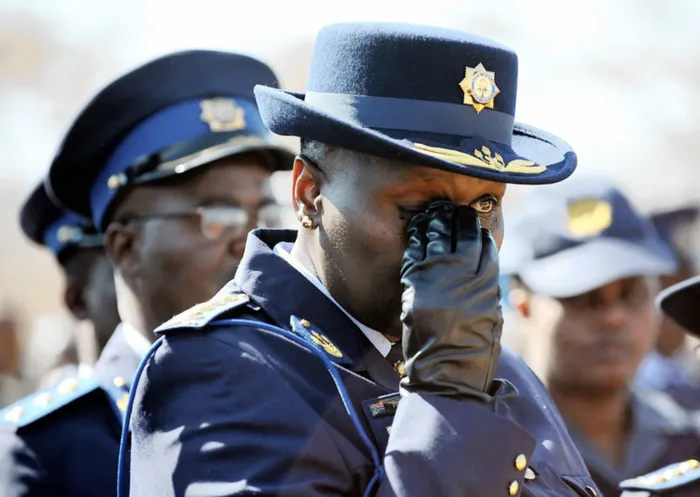Marikana cops’ bodies ‘gruesome’

275 National Commissioner Reah Phiyega wipes a tear during Sello Ronnie Lepaaku's funeral who was killed by miners during a strike at Lonmin Mines in Rustenburg, North West. The funeral is held in his home town of Seabe in Mpumalanga. 190812. Picture: Bongiwe Mchunu 275 National Commissioner Reah Phiyega wipes a tear during Sello Ronnie Lepaaku's funeral who was killed by miners during a strike at Lonmin Mines in Rustenburg, North West. The funeral is held in his home town of Seabe in Mpumalanga. 190812. Picture: Bongiwe Mchunu
Rustenburg -
It was gruesome to see the bodies of two policemen hacked to death by protesting mineworkers at Marikana, North West, a crime scene expert said on Monday.
This was the evidence of Lt-Col Cornelius Johannes Botha in an inquiry into the August 16 shooting at Lonmin's platinum mine in Marikana:
Dumisa Ntsebeza, for families of the miners who were shot dead, asked Botha: “I am told they 1/8the bodies 3/8 were a gruesome sight, would you confirm that?
Botha replied: “Sir, the people were hacked to death, it didn't look good.”
Asked to express his personal feelings, he said he was an experienced policeman who knew how to deal with emotions.
“After 28 years 1/8of service in the police 3/8, you learn to cut yourself off the scene. You tell yourself that you have a duty to do, even if it's the body of a policeman.”
The two policemen were killed in protest violence in Marikana on Aug 13.
Three days later, police shot dead 34 miners and wounded 78 when they tried to disperse strikers near the Lonmin mine.
A judicial commission chaired by retired Judge Ian Farlam resumed public hearings on the matter in Rustenburg on Monday as part of its inquiry into the shooting.
Ntsebeza asked Botha if his reaction to the bodies of his dead colleagues was not a commitment to ensuring that the people who had killed the policeman “must pay for it”.
Botha said: “All criminals are supposed to be brought to book. If you kill a policeman you must be brought to book, if you kill a civilian you must also be brought to book.”
He denied a claim by Ntsebeza that the graphic photographs he had taken of the bodies of the police officers during the post mortems were widely circulated among police.
Botha was also questioned about a video he took from a helicopter on the day of the shooting.
The video was screened at the inquiry, and ran for about 40
minutes.
A second shorter video, taken from another helicopter, was also viewed.
Dali Mpofu, for the injured and arrested miners, said the bulk of the video had been devoted to scenes away from the hill where the miners were shot dead.
Botha said he knew miners were on the hill and not at the hostels, at the Lonmin mine or in the veld.
“And yet your video devotes about 80 to 90 percent... to those areas just mentioned,” said Mpofu.
Botha said when he arrived at the scene there was no one on the hill any longer, but people were running in the veld.
He said he was sent to record a dispersing and disarming police operation.
Botha testified that two stun grenades were shot from the helicopter he was in.
He told the commission there were four helicopters in the air at the same time, two were police helicopters.
Botha said he did not know who the other two belonged to.
On Monday morning, the matter of funding the travel expenses of the bereaved families to attend the hearings, came before the commission.
The department of justice said it would fund the families of mineworkers killed who wanted to attend the inquiry.
Confusion arose on Saturday when the department issued a statement that it would no longer fund the attendance.
However, the department on Monday said it would fund those who wanted to attend.
The hearing continues on Tuesday. - Sapa